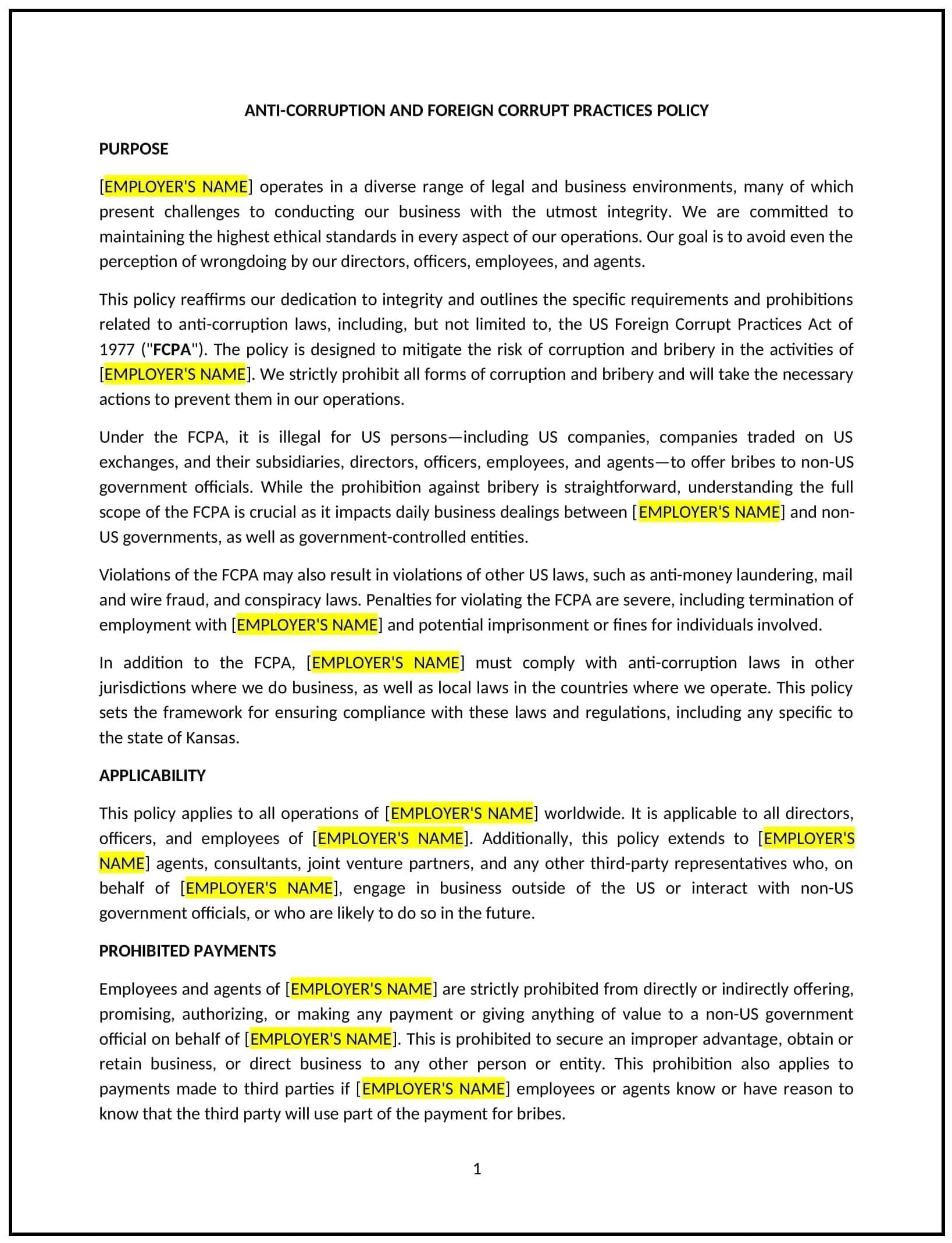Anti-corruption and foreign corrupt practices policy (Kansas): Free template
Got contracts to review? While you're here for policies, let Cobrief make contract review effortless—start your free review now.

Customize this template for free
Anti-corruption and foreign corrupt practices policy (Kansas)
An anti-corruption and foreign corrupt practices policy helps Kansas businesses establish clear guidelines for preventing bribery, unethical business dealings, and improper financial transactions. This policy supports ethical decision-making and protects businesses from legal and reputational risks associated with corrupt practices, particularly in international business operations.
By implementing this policy, businesses can promote ethical business practices, mitigate financial and legal risks, and strengthen trust with clients, partners, and regulatory authorities.
How to use this anti-corruption and foreign corrupt practices policy (Kansas)
- Define prohibited activities: Businesses should clearly outline activities that constitute corruption, including bribery, kickbacks, and improper gifts or payments to officials or third parties.
- Establish reporting expectations: Employees and stakeholders should have a clear process for reporting suspected corruption or unethical conduct without fear of retaliation.
- Outline third-party relationships: Businesses should set due diligence requirements when engaging with vendors, contractors, or international partners to prevent indirect involvement in corrupt activities.
- Set internal controls: Businesses should implement procedures to monitor financial transactions, gifts, and expenditures to detect and prevent potential corruption risks.
- Provide employee training: Businesses should educate employees on anti-corruption laws, ethical decision-making, and the consequences of engaging in corrupt practices.
- Maintain transparency: Businesses should require accurate record-keeping to prevent fraudulent financial reporting or concealed transactions.
- Review and update regularly: Businesses should assess and refine the policy to address emerging risks, regulatory changes, or industry best practices.
Benefits of using an anti-corruption and foreign corrupt practices policy (Kansas)
- Promotes ethical business practices: Establishes clear expectations for employees and stakeholders to operate with integrity.
- Reduces legal and financial risks: Helps businesses prevent costly legal disputes, fines, and reputational damage.
- Strengthens business relationships: Enhances trust with partners, investors, and customers by demonstrating a commitment to ethical conduct.
- Prevents internal fraud: Encourages transparency and accountability in financial transactions and decision-making.
- Supports regulatory adherence: Helps businesses align with anti-corruption laws and industry standards without making legal guarantees.
- Enhances internal oversight: Establishes structured reporting mechanisms to detect and address potential violations.
Tips for using this anti-corruption and foreign corrupt practices policy (Kansas)
- Communicate expectations clearly: Businesses should ensure that employees understand the policy and the consequences of engaging in corrupt practices.
- Provide accessible reporting channels: Establish confidential mechanisms for employees and stakeholders to report suspected violations.
- Conduct regular training: Businesses should offer training on ethical business practices and potential corruption risks relevant to their industry.
- Implement due diligence for third parties: Businesses should evaluate the risk level of vendors, contractors, and partners before entering into agreements.
- Monitor financial activities: Regular audits and oversight help detect unusual transactions and prevent internal fraud.
- Address policy violations consistently: Businesses should have a structured response plan to investigate and act on any breaches.